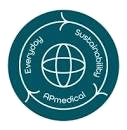Sustainability
It is APmedical’s belief that business has an important role to play in creating a better and more sustainable world.
Medical waste containers must comply with the most severe requirements established by international standards and national authorities that ensure a safe use and transport, due to their potentially highly infectious content.
Moreover, by participating in ISO Standards Committee discussions, APmedical supports and pushes the development of industry-wide quality standards to extend the practice of circularity to these disposable containers. By using recycled materials, the impact generated by their disposal has a much lower negative effect on the environment.
Contributing at the creation of a circular economy is a great opportunity for growing: APmedical started lots of projects aimed at increasing the use of recycled resins in its products. However, not only raw materials characteristics, but also supplier reliability is a critical point for APmedical. Researches, analyses and tests have been performed in order to find the most suitable recycled material mix.
APmedical developed new certified “ECO Lines” consisting of containers for the disposal of special hospital waste and sharp and cutting objects, which are produced using recycled materials and at the same time satisfy the quality standards requested by the ADR-UN (REC marking) to secure transportation and ISO 23907-1:2019 to secure utilisation.
The new “ECO Lines” obtained the two main recognised safety marks for medical waste containers: Marque NF from Laboratoire national de métrologie et d’essais (France) and Kitemark from British Standards Institution (UK).
Keter presented its first annual sustainability report in 2020. Sustainability reports are written according to GRI (Global Reporting Initiative) standards, they relate to SDGs (Sustainable Development Goals) and cover all the necessary information in terms of ESG (Environment, Social & Corporate Governance).
Moreover, Keter formulated a coherent strategy comprising multi-year targets demonstrating its specific commitment to sustainability. A comprehensive materiality assessment has been completed, drawing input from a wide range of sources and stakeholders. Based on Keter’s material impacts, resources are allocated to further accelerate the reduction of the negative effects on the environment and local communities.
